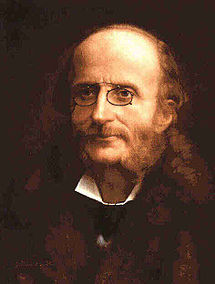- Mesdames de la Halle
-
Jacques Offenbach  Operas
Operas- Les deux aveugles (1855)
- Le violoneux (1855)
- Ba-ta-clan (1855)
- La rose de Saint-Flour (1856)
- Le 66 (1856)
- Le financier et le savetier (1856)
- La bonne d'enfant (1856)
- Croquefer, ou Le dernier des paladins (1857)
- Le mariage aux lanternes (1857)
- Mesdames de la Halle (1858)
- La chatte métamorphosée en femme (1858)
- Orpheus in the Underworld (1858)
- Geneviève de Brabant (1859)
- Daphnis et Chloé (1860)
- Le pont des soupirs (1861)
- M. Choufleuri restera chez lui le . . . (1861)
- Monsieur et Madame Denis (1862)
- Les bavards (1862)
- Il signor Fagotto (1863)
- Lischen et Fritzchen (1863)
- Die Rheinnixen (1864)
- La belle Hélène (1864)
- Barbe-bleue (1866)
- La vie parisienne (1866)
- La Grande-Duchesse de Gérolstein (1867)
- Robinson Crusoé (1867)
- L'île de Tulipatan (1868)
- La Périchole (1868)
- Les brigands (1869)
- Le roi Carotte (1872)
- Fantasio (1872)
- Pomme d'api (1873)
- Maître Péronilla (1873)
- La jolie parfumeuse (1873)
- Bagatelle (1874)
- Madame l'archiduc (1874)
- Le voyage dans la lune (1875)
- Madame Favart (1878)
- La fille du tambour-major (1879)
- The Tales of Hoffmann (1880, unfinished)
Mesdames de la Halle is an opérette bouffe in one act by Jacques Offenbach, with a libretto by Armand Lapointe. It was first performed at the Théâtre des Bouffes Parisiens, Paris on 3 March 1858.[1] and was the first work of Offenbach's at the Bouffes with a chorus and a large cast.[2] Gänzl describes the piece as “a delicious piece of Parisian bouffonerie” [3]
Contents
Performance history
Bouffes on tour staged Mesdames de la Halle in Vienna with Lucille Tostée as Croûte-au-pot, then in Budapest, where a Hungarian version soon followed.[3]
It was performed in Berlin in 1858, Brussels in 1860, and Monte Carlo in 1908.[4] It was also produced at the Théâtre des Arts on 3 April 1913, conducted by Gabriel Grovlez and with a cast including Lucy Vauthrin, Marcelle Devries and Maurice Lamy. It was mounted at the Paris Opéra-Comique on 4 May 1940 with René Hérent, Lillie Grandval and Roger Bourdin, conducted by Gustave Cloez.[5]
Roles
Role Voice type Premiere Cast, 3 March 1858,
(Conductor: Offenbach)[2][6]Madame Poiretapée (fish seller) tenor Léonce Madame Madou (vegetable seller) baritone Désiré Madame Beurrefondu (vegetable seller) baritone Mesmacre Raflafla (drum major) tenor Duvernoy Le commissaire baritone Guyot Marchand d’habits tenor Jean Paul Ciboulette (vegetable seller) soprano Chabert Croûte-au-pot (kitchen boy) soprano Lise Tautin Marchande de plaisirs soprano Baudoin Marchande de fruits soprano Cico Marchande de légumes mezzo-soprano Kunzé Marchande de pois verts soprano Byard People of la Halle, customers, policemen, soldiers Synopsis
- The setting is the Marché des Innocents in the reign of Louis XV.
At the Paris fruit and vegetable market vendors of all kinds are plying for custom. The drum major, Raflafla, enters with some troops and sings a flattering song to the market women. Madou and Beurrefondu are not interested; they are after the young kitchen boy Croûte-au-pot, for whom Mesdames Poiretapée, Madou and Beurrefondue have all fallen. Croûte-au-pot enters, but singing of his love for the fruit seller Ciboulette. Madou and Beurrefondu press their wares on him, but when he upturns his basket, Raflafla re-enters and takes Croûte-au-pot off in a barrow. Madou and Beurrefondu fight with Poiretapée, which attracts the attention of the commissaire, the customers and Ciboulette; when the quarreling women have been led away, Ciboulette introduces herself, in song. When Raflafla tries to sweet-talk her she repulses him, despite the fact that her heart always misses a beat when she meets him. Poiretapée has bribed the commissaire with a drink and comes back to the market where Raflafla tries it on with her, by singing a ballad to the moon. Croûte-au-pot comes in, having jumped out of a window at the jail, and he and Ciboulette sing a happy duet.
Beurrefondu re-enters, disapproving of Ciboulette's liaison with the kitchen-boy. Ciboulette says that as an orphan the consent of her parents will be difficult to obtain. She tells Beurrefondu that her father was a sergeant of guards, and she is eighteen, female and from Vaugirard. Beurrefondu faints into the fountain, and when dragged out claims Ciboulette as her daughter. When Beurrefondu recounts this to Madou she too faints in the fountain leading to a septet over the dilemma. Ciboulette next produces a sealed letter she has kept next to her heart since she was three months old; when Croûte-au-pot reads it out Raflafla and Poiretapée both faint, thus solving the mystery of her parents, who consent to her marriage. The curtain falls with all acclaiming the 'unequalled beauties – the ladies of la Halle'.
References
- ^ Lamb A. Jacques Offenbach (worklist). In: The New Grove Dictionary of Opera. Macmillan, London and New York, 1997.
- ^ a b Yon, Jean-Claude. Jacques Offenbach. Editions Gallimard, Paris, 2000.
- ^ a b Gänzl K. The Encyclopaedia of the Musical Theatre. Blackwell, Oxford, 1994.
- ^ Loewenberg A. Annals of Opera. London, John Calder, 1978.
- ^ Wolff S. Un demi-siècle d'Opéra-Comique (1900–1950). André Bonne, Paris, 1953.
- ^ IMSLP vocal score
Categories:- Operas by Jacques Offenbach
- French-language operas
- Operas
- One-act operas
- 1858 operas
- Opérettes
Wikimedia Foundation. 2010.
